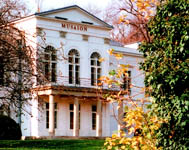
Mezinárodní konference, pořádaná FF UK ve spolupráci s mezinárodní badatelskou společností Ballad Commission/Kommission für Volksdichtung, se zaměří na roli balad při konstruování, vyjednávání a udržování kulturní a sociální paměti. Konference se zúčastní přes 30 předních badatelů z celého světa z oborů etnologie, folkloristika a etnomuzikologie a je pořádána ve dnech 31. 8. – 3. 9. 2018 v Národopisném muzeu Národního muzea v Letohrádku Kinských.
Songs are often thought of as capturing the memories of a people or community. They reflect cultural experience and, as David Buchan put it, they give expression to the “cultural preoccupations of—and sometimes the sense of identity of—a given group”. They are a record of human experience. But how is that record constructed? Whose memories are being recorded? How is that record maintained? And how do we use that record? Do we alter it, or try to preserve it unchanged? Do we accept its version of our past, or do we reshape and reuse it for our own purposes?
This 4-day international conference will explore the idea of memory in relation to ballads and folk songs by looking at songs as carriers of cultural and community memory, by looking at the mechanisms whereby songs old and new have been perpetuated, and how they are being remembered and reshaped in the digital age. It will delve into the reasons for maintaining memories through song.
Aktuální program konference naleznete níže:
Programme
| 31 August | ||
| 15:00–18:00 | Registration | |
| Introductions | ||
| 18:00–19:00 | Petr Janeček | “Czech songs should be lyrical, not epic!:” Czech Ballads and Balladry Between Romantic Nationalism and Academic Interest |
| 19:00–19:30 | Adam Votruba | Räuberballaden in der Tschechischen Republik und der Slowakei |
| 1 September | ||
| 09:00–11:00 | ||
| History and the Historical | ||
| Marjetka Golež Kaučič | Ballads as a Repository of Cultural Memory and as Carriers of Canonised National Tradition | |
| Robert Bouthillier | La destinée des chansons historiques dans la mémoire des communautés francophones d’aujourd’hui | |
| Lumnije Kadriu and Leontina Gega-Musa | Arbëresh Scanderbeg Songs as an Expression of Collective Memory, Longing, and Belonging | |
| Arbnora Dushi | Folk Song as Collective Memory: Historical Circumstances and National Community | |
| 11:00–11:30 | Break | |
| 11:30–13:00 | ||
| Rumen István Csörsz | “Inolus, Inolus, corde mihi solus:” A Latin–Hungarian Prisoner’s Song from the Eighteenth Century | |
| How Ballads Work | ||
| Thomas A. McKean | “That night in Caperquin:” The Agency of Memory in Scottish Ballads
|
|
| Ondrej Skovajsa | Memory and Formulas in Moravian and Slovakian Traditional Songs | |
| 13:00–14:00 | Lunch | |
| 14:00–16:00 | ||
| (Re)Living the Past | ||
| Valentina Bold | “Swords in the Stories:” The Ballad of Kinmont Willie | |
| Éva Guillorel | Les phénomènes de réactualisation historique dans les complaintes en langue bretonne entre le 16e siècle et la Révolution française | |
| Hye-Jin Choi | Transmitting Cultural Memory in Pansori | |
| Delia Dattilo | Identity, Genres, and Murder in Three Traditional American Folk Songs | |
| 16:00–16:30 | Break | |
| 16:30–18:00 | ||
| Matilda Burden | “Die een ou spook was vet en die ander ou spook was maer:” Ghosts, Memories, and a Ballad | |
| Simona Delić | Memory in the Sephardic Ballads of Mrs Batševa Altarac | |
| Adrienne M. Harris | The Evolving Role of Folk Song in Russian War Films: The Case of the Young Guard | |
| 2 September | ||
| 09:00–10:30 | ||
| Family Matters | ||
| Lene Halskov Hansen | Danish Occasional Songs as Collections of Family Memories | |
| Ana Maria Paiva Morão | “José pina e maribela:” A Ballad about a True Suicide Pact | |
| Andy Rouse | The Broken Token: Recognising and Remembering | |
| 10:30–11:00 | Break | |
| 11:00–12:00 | ||
| Youngsook Suh | Memory and aspects of Women’s Lives in Korean Narrative Songs | |
| Olimbi Velaj | Emigration as Drama: Personal and Collective Memories in “The Girl of the Waves” | |
| 12:00–21:00 | Excursion to Kouřim Open Air Museum, with Lunch provided | |
| 3 September | ||
| 09:00–11:00 | ||
| Disaster, Violence, Poverty, and War | ||
| Luigi Monge | African-American Disaster Songs and Memory | |
| María Herrera-Sobek | The Hurricane Chronicles: Memory, Environmental Tragedies, and Religious Belief in Extreme Weather Disaster Corridos | |
| Sabina Ispas | Singing Bells: First World War Songs in Romanian Tradition | |
| Sonja Petrović | Remembering the Poor in Serbian and South Slavic Oral Poetry | |
| 11:00–11:30 | Break | |
| 11:30–13:00 | ||
| Using Song | ||
| E. Wyn James | Songs and Identity in Welsh Patagonia | |
| Sara Kazmi | The Ballad of Dullah Bhatti: Cultural Contestations in Contemporary Punjab, Pakistan | |
| Ingrid Åkesson | Fictional Past Meets Lived Present: Society, Singers’ experiences, and Song Interpretation | |
| 13:00–14:00 | Lunch | |
| 14:00–15:00 | ||
| Kara O’Brien | “Land of Streams and Valleys:” Remembering and Reimagining Place in Traditional Irish Hunting Songs | |
| Trajko Petrovski | The Roma Ballad of the Walled-Up Wife: The Nine Brothers | |
| 15:00–16:00 | Business Meeting of the KfV – all welcome | |
| 16:00–16:30 | Break | |
| 16:30–18:15 | ||
| Ballad Scholarship | ||
| David Atkinson | Charting the Eighteenth-Century “Old Ballads” in England, c.1730–1780 | |
| Sigrid Rieuwerts | “On the grand tour in quest of old ballads:” (Re-)Visiting Blackhouse in the Scottish Borders | |
| Teresa Catarella (chair) | Roundtable Discussion | |
| 19:30 | Conference Dinner | |